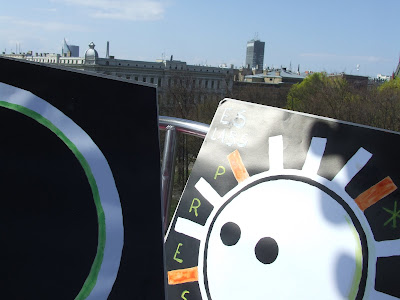Kāpēc Latvijā ir nepieciešama populisma atplauksme
The Latvian President’s speech last evening calling for the dismissal of the Latvian Saeima, http://www.delfi.lv/news/national/politics/zatlers-nolemj-rosinat-saeimas-atlaisanu.d?id=38755691 , a constitutionally sanctioned conclave of elected officials (deputies) who for twenty years have denied democracy a populist base, is a major step in an attempt to rescue Latvia from business interests turning the state into their private fiefdom.
Why Latvia Needs a Revival of Populism
Eso Antons Benjamiņš aka Jaņdžs
 |
| Populists on the rise |
The Latvian President’s speech last evening calling for the dismissal of the Latvian Saeima, http://www.delfi.lv/news/national/politics/zatlers-nolemj-rosinat-saeimas-atlaisanu.d?id=38755691 , a constitutionally sanctioned conclave of elected officials (deputies) who for twenty years have denied democracy a populist base, is a major step in an attempt to rescue Latvia from business interests turning the state into their private fiefdom.
At this time (judging from the public’s overall response on a number of internet forums) the President’s move has met with undisguised and enthusiastic approval. It remains to be seen how this approval translates itself in the coming weeks and months in public debate and actions.
As this blogger has often pointed out, the cause of the crisis in Latvian government—past and current—has a number of sources. It has roots, both, in the distant and near past.
 |
| Populist activist for President |
A major cause that has been inherited from the distant past and disgruntles the “inner” citizen in us is the loss of the spiritual inheritance (call it religion), traceable to the dissolution of proto-Latvian arch-Christian roots in the 11th to 13th centuries. The Crusade by neo-Christians (so-called Catholics at the time) against the kingdom of Jersika in 1209 serves as an early nodal point for Latvians as a people of whose rooms we still have the smell in our noses.
Coinciding with the crusade against the Cathars in Languedoc France
Unfortunately, while both arch- and neo-Christianity share in a message of love and non-violence, neo-Christianity used and continues to use the support of secular princes. These then used overwhelming violence against the Children of Johns and their leadership (Johns) in order to replace the people who constituted the proto-Latvians or Children of Johns activism with people who accepted their entombment (for all that an embodiment) among the so-called pa-gans.
While modern scholarship has a number of theories whence the name ‘pagan’, it most likely derives from the time when Latvia (and other parts of Europe) was deforested, and the forest dwellers were turned into pa-yans, re, lesser Johns, in due course to become ‘pagans’.
The demoralization of the Johns, their repression, and therewith transformation into payans (peasants), gradually reduced the Children of Johns (Jāņubērni) to serfdom and de facto slavery.
 |
| First ever photograph of a Populist Presidential candidate on a caroussel over Riga |
The ‘religion’ of Johns and their children, embedded in the endearing word of the Latvian language, has by today been reduced to a version of pseudo Latvian. The latter is the language of government, media, all ‘public’ life turned against the ‘privateness’ of Latvians living as an intimate and more or less homogeneous community. This separation of public and private has caused great havoc in the Latvian community by creating a perpetual ‘them’ as government and ‘us’, the invisible, the private, the ‘legally’ disemboweled people. “They” make all the laws, including such that serve them only, while “we” lose our former rights to use the word as lawmakers. Not surprisingly, “we” became apathetic.
As a result of President Zatler’s call for the dismissal of the Saeima, we—the ‘us’ of ‘them’—now are in the turbulent regions of what Freud called “the internal foreign territory”. The government (successive governments including) that has long violated the internal foreign territory of the “inner” Latvian, even to the extent of driving him-her unconscious of him-herself, is, suddenly, challenged by one as if of itself, the President.
 |
| Another Populist candidate cips into the picture |
There is no guarantee that the President’s move to dismiss the Saeima will in and of itself awaken the populist in Latvians. However, it necessarily creates the opportunity for the awakening of not only outrage at the surface of the deeps, but reach levels of repressed memories where the homogeneous community dwells.
What will the homogeneous Latvian community of tomorrow look like?
We cannot discount the possibility that Latvia Latvia
(to be continued…)










